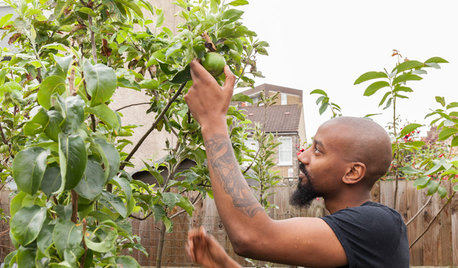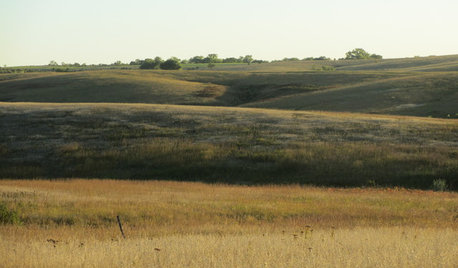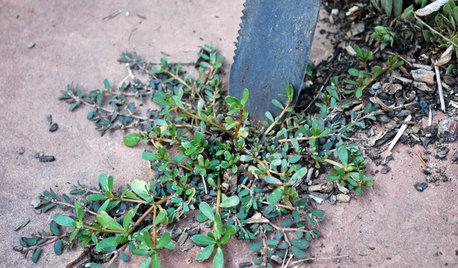No earthworms in Florida???
I just moved to Florida in January. Since then, we lived in an appartment and now moved to a house. In both places I dug outside and planted (can't help myself)but never found worms... is it because of the sandy soil? Confused
Does it influence the quality of the vegetables that grow on sandy soil? thinkShould I buy some? Any advice? Big Grin
Thanks
Comments (107)
jolj
8 years agoI do not see the big deal about earthworms.
& Mr brown is one of the best poster on this whole site in IMHO.
jwag4321
8 years agolast modified: 8 years agoThank you kimmsr for the ER web site, I have some sites I will include in my blog I hope they hi lite like yours (urs can I write a few short cut words I learned to save x), new bee to the blog community it's been yrs since I had internet, cell phone last couple yrs. I had to have the oldest daughter translate IMOH by jloj :). The oldest is trying to learn veggy gardening and that has given me a few chuckles ie Thinning- "...no Jen not trimming branches on the plant it has to do with spacing", "....first u identify the root portion of the asparagus. Does the pkg have a picture on it? U plant it root first dear, oookay u planted one up and 2 down, umm nature is pretty forgiving they will probably grow". Jen has moved to Az., she is in town for Thanksgiving. Jen has a EW "farm", she followed me to garden the other day,when I went out to bury some kitchen scraps, my shoveled dirt produced 2 EMs, one was cut in half oops! U would think I had decimated the entire EM population in the world. She promptly rescued the whole one and re-buried a safe distance from me. I suspect Jen has probably named all those EMs in her worm farm. I am glad she is tender hearted. Jen only has dogs that are adopted, is determined trash recycler, saving earth for next generation. God I love her. Anyway onward and upward. I came across a comment in another site about BT and decided I needed more info since I limit my insect control to BT, diatomaceous earth, homemade insecticidal soap. I was using Neem but stopped after reading back of bottle more thoroughly. Neem can kill bees. BUT, northcoastgardening.com stated neem ok if sprayed @ dawn or dusk, X's bees not active and will be dry by the X they are active. I haven't seen a bee in a Blue Moon and we don't have any Blue Moons. I have no luck with squash, cucumbers, water melons, pumpkins, only self pollinating plants. I have tried to pollinate them by hand. Back to BT. (Oops pressed one of icons and don't know how to go back). Here are the sites for Bt for u to browse if u like. npic.edu, bt.ucsd.edu. One thing that was mentioned on that last site, bt.ucsd.edu, was Bt GM (huh?... Oh, GM= genetically modified ), I only order seeds from a company that does not sell any GMO seeds, and here I find out someone is combining Bt with corn, potatoes, and God knows what else. My some what non-hazardous insect spray that can be used up to day of harvest but washes off easily is possibly in my food where no amount of washing will get rid of it!! Ok my views are not everyone's, sorry, some may find the Bt info enlightening, and useful. Nov. 27,2015
Related Professionals
Danbury Landscape Architects & Landscape Designers · Bainbridge Island Landscape Contractors · Beverly Hills Landscape Contractors · Chesapeake Ranch Estates Landscape Contractors · Cupertino Landscape Contractors · Elmhurst Landscape Contractors · Hilo Landscape Contractors · La Mirada Landscape Contractors · North Ridgeville Landscape Contractors · Selma Landscape Contractors · Mastic Decks, Patios & Outdoor Enclosures · Miami Decks, Patios & Outdoor Enclosures · Midlothian Decks, Patios & Outdoor Enclosures · Salisbury Decks, Patios & Outdoor Enclosures · Pleasant Grove Decks, Patios & Outdoor Enclosuresgardengal48 (PNW Z8/9)
8 years agoI would not be concerned about growing Bt impregnated produce. NO GMO'd seeds are available for home gardeners - this is a horrendously expensive process and it is reserved for big agriculture only, where the profits justifies the expense.
One just needs to mention "GMO's" in passing and everyone immediately panics. There are more misunderstandings about GMO's than just about any other issue in modern horticulture, most of it disseminated by scaremongers. These are not necessarily the ultimate evil that most make them out to be. But regardless of one's attitude concerning them, they do not have any application or presence in home gardening.
byw, insecticidal soap, regardless of whether homemade or prepared potassium salts of fatty acids, can be quite toxic to bees if they come into direct contact. Avoid spraying ANY pesticide, even organic or natural pesticides, when bees are active.
jwag4321
8 years agolast modified: 8 years agoThank u gardengal48, I just don't want to buy corn, potatoes, anything at grocery store that is infused with some kind of insecticide. I can't grow everything, I am still reliant on the grocery store for some food. My garden isn't that big. :(. I do plan to limit any spraying to dusk or dawn from one on. Thank u
kimmq
8 years agoThere is a great deal of misunderstanding about Genetically Modified plants and we have allowed the seed industry to usurp that term.
All of the plants we grow today have been genetically modified. The ones that are weed killer resistant or have a pesticide built in are Genetically Engineered. Genes from sources that would never make their way into a plants genetic structure are put there in a laboratory and there is ample evidence that this is not good for human consumption and that information is not being propagated by scaremongers. People that tell you otherwise are not organic minded and are the scaremongers among us.
There is nothing wrong with a plant that is genetically modified since all of our food plants have been and are being so modified each time they get pollinated. We are genetically modified versions of our parents and other ancestors, while a clone might be a genetically engineered version of the original.
kimmq is kimmsr
gardengal48 (PNW Z8/9)
8 years ago"there is ample evidence that this is not good for human consumption and
that information is not being propagated by scaremongers"I'm calling you out on this - SHOW us the scientific evidence and supporting documentation that supports this opinion. I seriously doubt anything credible exists. I've never seen any.
If you are eating anything made from corn or corn products or their derivatives - and the list of food products containing these is endless - then you are consuming a GMO'd (or 'genetically engineered', if you prefer) product. I have yet to see anyone that has consumed these products walking around sprouting two heads or falling over dead or babies born with birth defects attributed to these GMO's, so just exactly what is "not good" about them for human consumption??
Unfounded, unsubstantiated, vaguely generalized statements such as the above are the classic definition of scaremongering.
Regardless of the nonsense spouted in the above post, there are NO genetically modified/genetically engineered seeds available to home gardeners. Period.
jwag4321
8 years agolast modified: 8 years agoOk gang for those without the time to watch the grass grow but with web sites for those who want to read it for themselves.
GMO - can be defined as organisms (i.e. plants, animals or organisms) in which the GENETIC material (DNA) has been altered in a way that does not occur NATURALLY by mating and/or natural recombination. who.int
GENETIC ENGINEERING - is targeted and powerful method of introducing desirable traits into animals using recombinant DNA (rDNA) technology. DNA is the chemical inside nucleus of a cell that carries the GENETIC instructions for making LIVING ORGANISMS. Food and Drug Administration (.gov)Plants are living organisms.
A further explanation of GENETIC ENGINEERING -DNA HYBRIDIZATION - process of combining 2 complementary single-stranded DNA or RNA molecules and allowing them to form a single double-stranded molecule. ghr.nim.nih.gov. This sounds like they are inside the cell inserting the DNA or RNA.
HYBRIDIZATION -process of crossing two genetically different individuals to result in a third individual with a different often preferred set of traits. Plants of the same species cross easily and produce fertile progeny. Wide crosses are difficult to make and generally produce sterile progeny. lifeofplant.blogspot.com
sooo cross pollination by wind, insect, or someone sticking there finger or a soft brush in one flower and putting the gathered pollin in another flower is a more natural hybridization.
GMO, GENETIC ENGINEERING, DNA HYBRIDIZATION are all artificial means of changing any species. To me this is like " giving a baby a hand grenade ". Some fool turned the splitting of the atom into a nuclear bomb, and a nice guy turned it into a way to produce electricity. The human race, go figure.
jolj
8 years agoI get what you are saying, I want proof that Potus was born in the USA,too.
But I still do not see the proof for him or GMO's being harmful.
If the baby can not pull the pin, then thumb the clip, then the hand grenade is safe.
It is in what you know & what you do.
So where the proof?
kimmq
8 years agoNeither jwag nor I are saying that genetically modified organisms (GMOs) are harmful or unsafe. And we do not need to prove that genetically engineered foods are unsafe, it is the responsibility of those producing, and/or advocating, those product to prove that they are safe for consumption. That has not yet been done.
kimmq is kimmsr
jwag4321
8 years agoI mentioned the lack of bees, I may have to buy some of those funny little houses an bees (not the honey bee kind) if I want to grow cucumbers, squash, etc. I did receive a seed catalog that featured a squash that was self-pollinating. I will have to research the genus of this plant before I take a chance on growing it. On another note, I did plant 3 patio size zucchini plants with the hope that I could keep a close eye on them and hand pollinate them myself. Uh huh don't expect a zucchini dish in this lifetime. BUT when I wasn't looking a squash borer???, dug into the base of one plant. How do you prevent those puppies??
jwag4321
8 years agoThink if I put a little neem only on the base, after the sun goes down of course wouldn't want to hurt any of the non-existent bees, this would kill that critter and prevent it on the other 2 plants?
gardengal48 (PNW Z8/9)
8 years agokimmsr, YOU very clearly wrote "there is ample evidence that this is not good for human consumption" and now you are back-peddling to say you didn't. So which is it?? And you cannot expect to make half-baked, unsupported statements like that without being challenged for some proof of their veracity. Yes, you DO need to prove they are unsafe if you persist in making these unfounded claims - it is the ESSENCE of scaremongering to do otherwise.
btw, GMO'd protects undergo heavy testing before they are released to the marketplace. And the fact that a large percentage of the world's population is consuming foods with some connection to GMO'd crops without any widespread documented diseases or deaths associated with that consumption goes along way to disprove your contentions. Even the World Health Organization will not go so far to state that GMO'd foods are unsafe: "GM foods currently available on the international market have passed safety
assessments and are not likely to present risks for human health. In addition, no
effects on human health have been shown as a result of the consumption of such foods
by the general population in the countries where they have been approved.
Continuous application of safety assessments based on the Codex Alimentarius
principles and, where appropriate, adequate post market monitoring, should form the
basis for ensuring the safety of GM foods."So the ball is in your court........either provide evidence to support your claims (and you can't because it doesn't exist) or stop making them.
jwag4321
8 years agoAbout Roundup Ready Crops
Genetically Modified Food
Roundup Ready crops are crops genetically modified to be resistant to the herbicide Roundup. Roundup is the brand-name of a herbicide produced by Monsanto. Its active ingredient glyphosate was patented in the 1970s. Roundup is widely used by both people in their backyards and farmers in their fields. Roundup Ready plants are resistant to Roundup, so farmers that plant these seeds must use Roundup to keep other weeds from growing in their fields.
The first Roundup Ready crops were developed in 1996, with the introduction of genetically modified soybeans that are resistant to Roundup. These crops were developed to help farmers control weeds. Because the new crops are resistant to Roundup, the herbicide can be used in the fields to eliminate unwanted foliage. Current Roundup Ready crops include soy, corn, canola, alfalfa, cotton, and sorghum, with wheat under development.
Roundup Ready crop seeds have notoriously been referred to as "terminator seeds." This is because the crops produced from Roundup Ready seeds are sterile. Each year, farmers must purchase the most recent strain of seed from Monsanto. This means that farmers cannot reuse their best seed. Read more about terminator seeds.
To read more about genetically modified food from a few different perspectives, check out the key players page. To learn more about the impact of Roundup Ready seeds, check out the impact page.
jwag4321
8 years agoGreenpeace has issued a number of reports related to genetic engineering. A full listing is available on their website. Most relevant to our discussion is an outline of the legal history of Percy Schmeiser v. Monsanto (link). Schmeiser was sued after genetically engineered canola was discovered on his farm. Genetically engineered canola was introduced in Canada in the mid-1990s, and it has been impossible to grow non-genetically engineered canola due to massive contamination. Farmers are held responsible for any losses that occur due to genetic contamination. If a farmer's own seed becomes contaminated with genetically engineered canola, that canola becomes the property of Monsanto, according to a court order. In 2004, the Supreme Court of Canada ruled that Schmeiser violated Monsanto's patent when he grew canola that contained Monsanto's Roundup Ready gene. A more detailed timeline of the case can be found here.
These 2 comments from me are the result of typing in search engine - gmo corn with roundup - the site that came up - web.mit.edu.
kimmq
8 years agoIf you can read, and understand, what I wrote, gardengal, you would then be on the cusp of grasping the difference between Genetically Modified Organisms (which I have stated are okay) and Genetically Engineered Organisms (which are not okay). You keep falling back to your mindset that allows the Genetic Engineering people too usurp the term GMO.
Once again I will try to explain the terms. All of the plants and animals (including us humans) out and about today are the result of Genetic Modification, we are Genetically Modified Organisms. That happens every time an egg is fertilized and the DNA from two sources merges to create a new entity.
Genetic Engineering Takes a gene that would never meld with others in an entity and places it one a DNA strand and that used to be called adulteration and the Food And Drug Administration required extensive study of that to determine if that was safe. However, that is now considered to be substantially equivalent to the normal plant ?(animal, etc) breeding process that no studies are necessary.
So when you, and others, talk about these GMOs be sure to identify whether it is Genetic Engineering or Genetic Modification you are referring to.
kimmq is kimmsr
jwag4321
8 years agolast modified: 8 years agoOil coated brown paper (aka "Planter's Paper Mulch") degrades more slowly than untreated paper mulch as the oil makes it somewhat UV and water-resistant. They don't use cooking oil to make the commercial planter's paper (usually mineral oil or soybean oil) and it is incorporated into the paper slurry before pressing.
Grocery stores that still have brown paper bags, I am sure the cost of packaging our groceries is included in cost of our purchases, can be used like Planter's Paper Mulch and is a cheaper alternative. The bags can be cut open for single layer or pressed flat for double layer. The next step I suggest be done outside. I set up saw horses with boards to create a table, lay my stack of sacks on one end and just pull off one from stack treat move it to other side (end) of table and form a stack of treated bags. There are some friends and family that have those fryers for turkeys, I talked them into saving the used oil for me. I use a paint roller brush to apply the oil to the bags. Oh yes, for drainage, punch holes in papers before applying oil. A quick hole puncher can be made by pounding nails in a short 1x3 board with nail or screw centered between ends of board then attach a dowel for a handle. If you lay those papers, 1-2, on grass or bare ground then "stamp" with "hole puncher" is a faster way to accomplish that part. Think of this as cheap homemade landscape material. I use it between bushes, in flower beds before adding mulch. I use in garden when setting out plants, just use box cutter or knife to cut "X" set plant and mulch. I like to garden not weed. No I have not noticed an increase in nasty bugs or odor.
In Florida if we do raised beds out of ANY kind of wood we will have to replace the boards sooner or later. I hate the cost, and labor involved. I am trying another idea for preserving wooden raised beds. Look up Ancient Japanese wood preservation called Shou-sugi-ban. If you haven't heard about it check it out see what u think.
jwag4321
8 years agolast modified: 8 years ago"how much distance needed to prevent cross-pollination of corn" Preventing GMO Contamination in Your Open-Pollinated Corn. blog-seedsavers.org. This site documents that cross-pollination can occur between GMO corn and non-GMO strain of corn for instance. If purity of seed for seed saving is ur goal this info might be of concern to u.
"same search as above" Cross Pollination from Genetically Engineered Corn: Wind transport. www.agbioforum.org. This site also documents cross-pollination or contamination. This speaks more to the concerns of the organic farmers.
corn is just an example I would imagine how religiously u are practicing organic gardening u would want to know what is being grown around u, ur county?? Roll ur eyes now.
gardengal48 (PNW Z8/9)
8 years agolast modified: 8 years agokimmsr, save yourself any further embarrassment and look up the accepted definition of a genetically modified organism (GMO).
Genetically modified organisms (GMOs) can be defined as organisms (i.e. plants, animals or microorganisms) in which the genetic material (DNA) has been altered in a way that does not occur naturally by mating and/or natural recombination. (WHO)
GMO definition. The abbreviation for genetically modified organism. A GMO is an organism whose genome has been altered by the techniques of genetic engineering so that its DNA contains one or more genes not normally found there.(Dictionary,com)
GMO stands for Genetically Modified Organism. Other names for
the process include Genetic Engineering (GE) or Genetic Modification
(GM), which are one and the same.How is a GMO Different from Hybridization / Cross-Breeding?
Genetic modification is the process of forcing genes from one species into another entirely unrelated species. Unlike cross breeding or hybridization—both of which involve two related
species and have been done without ill effects for centuries—genetic
engineering forcefully breaches the naturally-occuring barriers between
species.(GMO Awareness)
I think you are the only one putting distinctions to these definition that do not exist.kimmq
8 years agoSimply because the terms are "generally accepted" does not make them right or correct. There is a difference as I have attempted to explain in quite simple terms that some people seem unable, or unwilling, to grasp.
kimmq is kimmsr
jwag4321
8 years agolast modified: 8 years agoNow that we are all on the same "page", thank you Gardengal you did say it better. By ur definitions I would therefore have to define my gardening efforts as a quasi organic gardener. I will only spray at dusk or dawn, only use organic type bug control, I will try not to kill any good bugs but I will not buy a box of bugs either well maybe I will buy some of those funny bees and the funny house they like to live in since honey bees are non-existent In my garden. Oh yes and maybe an EW box since they might be faster than the compost bin I bought.
jwag4321
8 years agolast modified: 8 years agoThat last comment gives the correct date but it is 6:47a.m. here in Central Florida. This not "Sleepless in Seattle" or Florida. :)
jwag4321
8 years agolast modified: 8 years agoSooo, Kimmq, "M" or "MO", Modification or Modification of Organism can be natural or someone fooling around in a lab with the nucleus of an organism. GE, Genetic Engineering, someone is definitely in a LAB messing with the nucleus of an organism's, the DNA in particular. Right? Is this the correct understanding of this discussion? Anytime we change an organism, naturally or unnaturally, it will occur on the genetic level.
gardengal48 (PNW Z8/9)
8 years agoThe "difference" is only in your own head, kimmsr. Excuse me if I choose to take definitions (equally uniform if you'll note) provided by large, science-based organizations dealing directly with this relatively new plant technology over those promoted by a virtually anonymous, self-important poster of unknown background on a plant discussion forum!! Really?? Are you now promoting yourself as more of an authority on GMO's than the World Health Organization?? Ooooh, the ego!!
jwag, if you'll reread those definitions, you will see that they are used interchangeably - there is no significant difference between a Genetically Modified Organism (GMO) and a Genetically Engineered (GE) one. Both refer to a process of manipulating the genetic material (DNA) in a way that does not occur naturally by mating and/or natural recombination.
theforgottenone1013 (SE MI zone 5b/6a)
8 years agoOh geez. This is ridiculous. Hope the OP still isn't getting emails from this thread....
Rodney
jwag4321
8 years agoCan we discuss those "funny bees", I have a name for them now, Blue Orchard Mason Bees. Yes I am whining about my lack of Honey Bees because I can only grow veggys that self-pollinate. Before I invest in some I will search the net but would appreciate feedback from anyone with 1st hand knowledge. Hopefully, this won't cause a strong controversy like the earth worms. :)
theforgottenone1013 (SE MI zone 5b/6a)
8 years agoYou should start a new thread if you want to discuss a new topic, jwag. This particular thread should have been about earthworms, nothing more.
Rodney
gardengal48 (PNW Z8/9)
8 years agoI'd be happy to discuss orchard mason bees and plant pollination with you, jwag, but it would be best if you started another thread addressing that topic.
And let's not get too hung up about this thread diverting from its original subject - it happens all the time and often produces some interesting and informative discussions. NBD
jwag4321
8 years agolast modified: 8 years agoI think I started a new thread, look for 'need pollinators .....
gardengal48 (PNW Z8/9)
8 years agojwag, no new thread showing up here (Organic Gardening forum).
To start a new thread in this forum, exit this thread and get back to the screen showing all the thread topics for this forum. Under the title bar 'Organic Gardening' will be a subject line, followed by a text block where you can outline your question and attach any links or photos. Once you have composed your request, just hit the "post" button and you are good to go.
jwag4321
8 years agoGardengal, I managed to finally figure it out, U will find me in Organic garden forum, like u said, under post 'needpollinatorsforgarden...' . They only gave so many letters so I squinched it together :)
theforgottenone1013 (SE MI zone 5b/6a)
8 years ago"And let's not get too hung up about this thread diverting from its
original subject - it happens all the time and often produces some
interesting and informative discussions. NBD"Sometimes, yes, a change in topic does turn into an interesting conversation. But when there are a dozen or more argumentative comments about what is or is not the definition of GM/GMO or GE on an earthworm thread it's nothing more than useless bickering. If/when someone comes across this thread in the future it can be off-putting and could prevent them from joining this site (I've been a member here for several years and even I find it off-putting).
Rodney
spedigrees z4VT
8 years agoKim, you are right about earthworms; wrong on GMOs. The terms "genetically modified" and "genetically engineered" are synonymous, both legally and by definition. You are confusing genetic modification with hybridization, selective breeding, and natural selection.
jolj
8 years agoHybridization being called a type of "Genetic modification" is an very old argument that has popped on many unrelated thread, but never made into a thread of it's own.
jwag4321
8 years agoBuild a better mouse trap and they will come. I don't know if that is the way that saying goes. I consider my raised beds "mixing bowls" every other year or so I renew a bed from the ground up. I take soil out of bed #1 completely, put 4-6" of grass clippings back in, with bed #2 I take out 1/2 the soil and mix in compost with remaining soil in #2 bed. This improved, refreshed soil is used to fill back up bed #1 then it is ready to be planted. When digging out bed #1 or #2 I run across EMs due to OM from previous times I have done this process. I did not see that many worms when I first started the garden in its present location. Does the adding of Organic Matter draw worms? I think it is a given. :)
kimmq
8 years agoNumerous horticulturists and botanists agree that there is a difference between Genetic Modification and Genetic Engineering and Sandra Merrill does a good job of explaining that in the article "When it comes to GMOs, language matters." to be found in the April, 2014 issue of Fine Gardening. It is, I think, similar to using a noun, gift, as a verb, give. as in "I am gifting you this" when a perfectly good verb exists to express the same thought, as in "I am giving you this."Ms. Merrill points out, in the article that it was the media, journalists, that coined the acronym, not horticulturists or research scientists.
kimmq is kimmsr
spedigrees z4VT
8 years agoMy state recently enacted a labeling law, requiring that all genetically modified foods must be labeled as such. They're not referring to fruits from hybridized trees or plants that have been selectively bred I can assure you. Our law uses the legal definition of the term which can be found at these two links:
http://www.gov.scot/Topics/farmingrural/Agriculture/Environment/15159/definition
kimmq
8 years agoThen, according to the definition used every food sold will have to be labeled as a Genetically Modified Organism.
kimmq is kimmsr
jwag4321
8 years agolast modified: 8 years agoSorry, internetiot, ur thread on EW was hijacked but there only so much one can say about them. My suggestion is treat any area u want EWs like one of those EW farms u can purchase to raise worms in, 1) add organic matter (kitchen waste, veggy peelings etc., shredded paper, leaves, grass clippings, etc. 2) if worms don't show up fast enough for u buy some worms. Territorial Seed Co. and other seed companies sell them. "Seed" the area u chose with them. TaDa worms in ur garden.
spedigrees, good sites thank u.
kimmq, GM, GE, GMO is a process that you and I can't do, unless u have an elaborate lab tucked in ur garage - I don't. I love Gerbera Daisys, my budget only allowed for the purchase of 6 light pink. One of those plants was a lighter pink, yes yes, I will protect it with my life (not totally nuts just budget limitations). That said I needed/wanted more lite pink plants so I stuck my finger in the lightest pink ones every time I passed by, when it produced seed I planted them. It took 2 tries before I had results, 14 plants, will they be like the mother plant? Since I did not "bag" those blooms some other little "helper" could have had a go at the same lite blooms. When these new plants bloom I will know if I succeeded in producing more lite pink Gerbera Daisys huh.
If a pollinator, wind, or me caused the resulting lite pink blooms I consider it all a Natural way, if me or nature produces something that, like me taking the bloom from a white Gerbera and rubbing it on the pink one, it is nothing more than what a bee could have done. Still a natural process. GM, GE, GMO, requires manipulation of the DNA with elaborate equipment in a lab. :)
kimmq
8 years agoGenetic modification happens every time a flower is pollinated. Genetic Engineering can only occur in a laboratory where genes from sources that would never make it into a plants DNA are inserted. Genetic modification is a natural process while genetic engineering is not.
http://www.sustainabletable.org/264/genetic-engineering
kimmq is kimmsr
gardengal48 (PNW Z8/9)
8 years agoNo jwag - that's NOT what you just said :-) You made it clear with your last statement: "GM, GE, GMO, requires manipulation of the DNA with elaborate equipment in a lab", which is an accurate representation of those terms. OTOH, Kimmsr's comment was "Genetic modification is a natural process while genetic engineering is not", which is a concept not widely held or accepted by any recognized horticultural authority.
There IS a legal definition of GMO - "the term genetically modified organism (GMO) means an organism in which
the genetic material has been altered in a way that does not occur
naturally through fertilisation and/or natural recombination. GMOs may
be plants, animals or micro-organisms, such as bacteria, parasites and
fungi."This definition is accepted/recognized by the World Health Organization, the European Food Safety Authority, the EU, the FDA and the EPA. To claim that any sort of hybridization is essentially genetic modification in view of this definition is specious at best and glosses over any concerns - real or imagined - that GMO's have little to no more impact on either the environment or on human health and safety than do hybrid plants, whether naturally occurring or produced under a controlled process.
Since kimmsr is so fond of both Mother Earth News and the Rodale Institute and quotes from them and links to them frequently, how does he reconcile his blended (and legally inaccurate) definition with their clear separation of hybridization and genetic modification? You can't have it both ways.
jwag4321
8 years agolast modified: 8 years agoWe could go on all day long. If a human with a brush or a finger, or a pollinator deposits pollen in 2 like or 2 different species of plants and Nature allows it I will eat the "fruit" of this plant. The key word is Pollen, not interested in eating or growing anything the has had its DNA manipulated in some lab. Period.
if enough people refuse to purchase something, consumer backlash, and it affects a company's profit ..... Money talks and Bull... Walks!!!
kimmq
8 years agoAs I have stated before, gardengal, there are a large number of horticulturists and botanists that disagree with that "legal" definition of Genetic Modification.
Contrary to law there have been no tests done on Genetically Engineered foods to see if it is safe for us to eat them except that last 50 years of doing so. We do not know, and cannot know, what these foods may be doing to us and congress is going to make that even more difficult by forbidding states from requiring labeling of these adulterated foods.
kimmq is kimmsr
jwag4321
8 years agoMy daughter has Ulcerative Colitis. She has changed her diet to: no preservatives, gluten free, dairy free (soy milk only), takes probiotics, eats only organic foods. She has had less flare ups. That is why I am trying to garden organically, I grow what ever she likes to eat, saves on her grocery bill and I know what she puts in her mouth when it comes to my veggies. :)
Chris Orr
5 years agoI live in Ruskin (Hillsborough County) and although I have to hunt for them, I do find earthworms from time to time, usually under logs that retain some moisture underneath. They definitely exist, but are not abundant in my yard.
Ray McCarty
3 years agoI came here for the original question, and found a person that uses this forum as a bully pulpit. Nice job. Enjoy your echo chamber and your useless rants. Later all.
Ken Hoying
10 months agoI am on an abandoned golf course on the west side of Tampa Bay and have never seen an earth worm. I was thinking possibly due to the fact they used to use lots of chemicals on the lawns and course and they have been exterminated in this area. Yes, it is sandy soil but enough organics and I garden a lot.

















gnappi